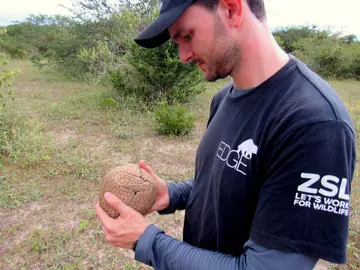
Community-based conservation
Human-wildlife interactions
EDGE
Institute of Zoology
Zoological Society of London
London
NW1 4RY
Combining participatory conservation and research to conserve armadillos and anteaters in Central and South America.
Armadillos and anteaters are endemic species to the Americas, however knowledge about their biology is insufficient to support their effective conservation. In the Caatinga dry forests of Brazil, and many other ecosystems across Latin America, these species are suffering from human-driven declines in population, in part due to over-exploitation and habitat loss.
By using a combination of participatory research and conservation, Rodolfo's work aims to expand knowledge about the species' biology, especially their spatial and temporal responses to human disturbance in Latin America. This research goes alongside working locally in the Caatinga with rural communities to leverage their engagement into the conservation of those species, ensuring local communities are actively involved in decision-making processes regarding protection of the species.

2023-Present: PhD in Genetics, Evolution and Environment, University College London and ZSL
2018-2020: Master’s degree in Ecology, Conservation, and Wildlife Management, Federal University of Minas Gerais (UFMG)
2012-2016: Bachelor’s degree in biological sciences, UFMG
2022-Present: Associate Researcher at NGO Instituto Tamanduá
2021-2023: Fellow of the EDGE of Existence Programme, ZSL
Devarajan K, Fidino M, Farris ZJ, et al (2025) When the wild things are: Defining mammalian diel activity and plasticity. Sci Adv 11:1–15. https://doi.org/10.1126/sciadv.ado3843
Eterovick PC, Kloh JS, Figueredo CC, et al (2020) Background choice and immobility as context dependent tadpole responses to perceived predation risk. Scientific Reports 10:13577. https://doi.org/10.1038/s41598-020-70274-w
Feijó A, Magalhães RA, Bocchiglieri A, et al (2022) Defining priority areas for proactive and reactive conservation practices for poorly known species: a case study of the endemic Brazilian three-banded armadillo. Cambridge Prisms: Extinction. https://doi.org/10.1017/ext.2022.2
Magalhães RA, Barnes PA, Rodrigues FHG, et al (2024) Local Ecological Knowledge on the Natural History and Human–Fauna Relationships of the Brazilian Three-banded Armadillo (Tolypeutes tricinctus) in Northeast Brazil. J Ethnobiol. https://doi.org/10.1177/02780771241261227
Magalhães RA, Drumond MA, Massara RL, Rodrigues FHG (2022). Reconciling scientific and local ecological knowledge to identify priority mammals for conservation in a dry forest area in northeast Brazil. Journal for Nature Conservation 70:126301. https://doi.org/10.1016/j.jnc.2022.126301
Magalhães RA, Feijó A, Bocchiglieri A, et al (2022) Cephalic shield morphology as species diagnostic trait and individual natural mark in three-banded armadillos (Tolypeutes; Cingulata: Chlamyphoridae). Mammalia 86:632-640. https://doi.org/10.1515/mammalia-2022-0022
Magalhães, R.A., Massara, R.L., de Oliveira, F.S., Rodrigues FHG (2022) The Brazilian three-banded armadillo is widely distributed in a human-modified landscape in northeastern Brazil. Mammal Research 68:53–62. https://doi.org/10.1007/s13364-022-00651-5
Magalhães RA, Sena LMM de, Rodrigues FHG (2021) First records of Brazilian three-banded armadillo (Tolypeutes tricinctus, Mammalia, Cingulata, Chlamyphoridae) predation by jaguar (Panthera onca, Mammalia, Carnivora, Felidae). Papeis Avulsos de Zoologia 61:e20216158. https://doi.org/10.11606/1807-0205/2021.61.58
Magalhães RA, Teles D, Barnes PA, et al (2023) A survival blueprint for the Brazilian Three-banded Armadillo, Tolypeutes tricinctus, an output from the EDGE of Existence fellowship, Zoological Society of London, London, UK. 38
Nagy‐Reis M, Oshima JE de F, Kanda CZ, et al (2020) Neotropical Carnivores: a data set on carnivore distribution in the Neotropics. Ecology 101:e03128. https://doi.org/10.1002/ecy.3128
Santos PM, Bocchiglieri A, Chiarello AG, et al (2019) Neotropical Xenarthrans: a data set of occurrence of xenarthran species in the Neotropics. Ecology 100:e02663. https://doi.org/10.1002/ecy.2663
